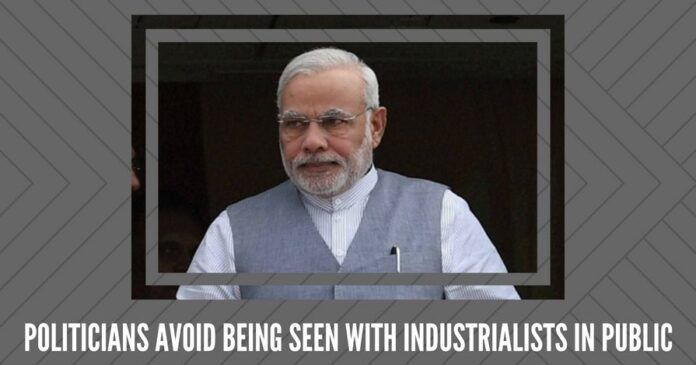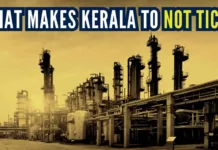
This is the reality of Gandhi’s tendentious remarks about Modi’s favoured industrialists. Former chief economic adviser, Arvind Subramanian used to call this stigmatized capitalism
Prime Minister Narendra Modi highlighted political hypocrisy when he said that leaders avoid being seen with industrialists in public but behave obsequiously with them in private meetings. His statement actually underlines many a pathology of India’s political economy.
This is a false binary, promoted by the Left for decades. This presupposes a class war, an endless conflict between the big business and common people, between industrialists and workers, between the rich and the poor, between the haves and have-nots
He was speaking at the launch of various development projects in Lucknow on Sunday. Just like farmers, artisans, bankers, workers, and government servants, industrialists play an important role in nation-building. “Should we insult them? Should we call them thieves and burglars,” he said, adding, “But yes, one indulges in wrongdoing, he either has to flee the country or has to spend his life inside a jail.”
The Prime Minister went on to mention that Mahatma Gandhi was so close to G.D. Birla that he stayed at the industrialist’s residence. “He stood with Birlaji, never concealed his relations with him because his character was pure.” But today politicians keep distance with businessmen in public but do “saashtang dandvat” (prostrate before them) behind the scene, Modi said.
Evidently, he was taking a dig at Congress president Rahul Gandhi’s recent attacks on the Modi regime for its alleged proximity with tycoons. As a leader of the Opposition, Gandhi has the right to criticize the government, but the big business should not the collateral damage, which it becomes because of Gandhi’s petty politicking. When he dubbed the Modi government as “suit-boot ki sarkar” some time ago, he meant that it worked only for corporate bosses and not for ordinary people.
This is a false binary, promoted by the Left for decades. This presupposes a class war, an endless conflict between the big business and common people, between industrialists and workers, between the rich and the poor, between the haves and have-nots. This is about a zero-sum game in which the two sets of people continuously fight with each other, and one can benefit only at the expense of the other. Nothing could be farther from the truth.
My hypothesis is that India is affected by stigmatized capitalism, where there is not enough trust in the private sector or in the ability of the state to regulate the private sector
For economic development benefits all—the rich, the not-so-rich, and the poor. Of course, the rich get the most but the poor also gain a lot; it’s certainly not the case of, what the Left says, ‘the rich getting richer and the poor poorer’; the rich get richer and the poor less poor.
But, unfortunately, even though the Congress initiated liberalization in 1991 and the Bharatiya Janata Party continued it later, the socialist dogmas continue to pervert economic thinking—and not just of the grand old party. This gets reflected in the statements of Rahul Gandhi and many other leaders. And since, in the Left’s myth-making, reforms are about helping the big business, demagogues besmirch anybody who stands for reforms.
This is the reality of Gandhi’s tendentious remarks about Modi’s favoured industrialists. Former chief economic adviser, Arvind Subramanian used to call this “stigmatized capitalism.”
In the pre-1991 era, the success of private companies was often directly proportional in their aptitude in navigating through the maze of rules and regulations, in getting licences, permits, and quotas. This inevitably involved in unsavoury practices, which made their reputation bad. “Some of this stigma was washed away during the IT boom that started in the 1990s, because the sector had developed on intrinsic competitive merit rather than proximity to government, had adopted exemplary governance standards, listed on international stock exchanges, and thrived in the global market place,” noted Economic Survey 2017-18.
Much of the stigma, however, still persists.
“My hypothesis is that India is affected by stigmatized capitalism, where there is not enough trust in the private sector or in the ability of the state to regulate the private sector. It is making it much more difficult to give the private sector a bigger role. It is easier to give a public or a quasi-public entity a bigger role rather than getting more private sector participation,” Subramanian recently said in his interview with a newspaper.
It is good that Modi has tried to, if not de-stigmatize capitalism, at least lessen its severity. But just one statement will not help either big business or the country; the policies and attitudes of his government should also show faith in industrialists. That, unluckily, is not happening. One hopes that the Prime Minister’s statement in Lucknow was not one-off.
Note:
1. The views expressed here are those of the author and do not necessarily represent or reflect the views of PGurus.
- Liberty Is Penalized, Violence Goes Untouched - December 21, 2019
- Rahul’s Howdy bloomer - September 22, 2019
- Chidambaram’s hypocrisy - August 22, 2019











Modi is doing well now by sidelining his Finance Secretary, who was hell bent on destroying Indian businesses with his tax terrorism. Piyush Goyal should be made full time FM to undo a lot of undesirables. Modi must do the following now
1. Raise IT exemption to 10 lakhs
2. Exempt pension from IT
3. End tax terrorism on professionals and SMEs
4. Liberalise company Law for at least for private companies
I wish the author studied this topic a bit more. The innocent statements of our prime minister make me wonder if the opponents, who at the very least feel that hobnobbing with businessmen is morally wrong, have got their values right.
For starters, the author might want to have a look at the value of Indian farm imports in 1990 and in 2016-17.
We wouldn’t have discussed the topic, if electricity was not invented. We now have aircraft’s,air conditioners, TVs, smart phones, automobiles, hospital equipment etc all of which are not made by introvert politicians, but thoroughly enjoyed by them. Who made these comfort gadgets?
In the current age wealth is controlled by governments and industrialists/ agri cum marine farmers. While wealth is not created by government it is generated by latter which is circulated among humans. The parasites which are not contributing to wealth are in majority and belong to journalism,legal profession,cine field,share brokers,politicians, administrators etc.
While a goonda can shine in any profession, it is hard work, humility and divine grace that makes one an industrialist. The rouge industrialists projected in media have been made rouges by the prevailing system.Bad apples are every where and perhaps India is only country where wealth creaters are looked down specially by the political class but At the same time they shout about jobs. What a hypocracy.
US is No one in world because of industrialists. To cite an incident—-Once Ford was on way from US to London when his secretary reminded him of his torn collar. Ford quipped “ don’t worry, every one knows I am Ford “. On landing in London, his secretary again reminded about his torn collar and Ford quipped “ don’t worry, no one knows I am Ford” and proceeded to his meeting. This is the nature of a industrialist.
Need to ssend this Pappu to Artic area. Illiterate & immature comments.
Should learn from Japan, Korea and now china as how their governments protect and help their business houses to secure multi billion international deals to improve their economy.